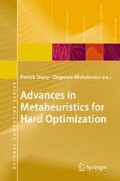Abstract
In this chapter we present the integration of an ant-based algorithm with a greedy algorithm for optimizing the scheduling of a multistage plant in the consumer packaged goods industry. The multistage manufacturing plant is comprised of different stages: mixing, storage, packing and finished goods storage, and is an extension of the classic Flowshop Scheduling Problem (FSP).We propose a new algorithm for the Multistage Flowshop Scheduling Problem (MSFSP) for finding optimized solutions. Theschedulingmust provide both optimal and flexible solutions to respond to fluctuations in the demand and operations of the plants while minimizing costs and times of operation. Optimization of each stage in the plant is an increasingly complex task when considering limited capacity and connectivity of the stages, and the constraints they mutually impose on each other.
Access this chapter
Tax calculation will be finalised at checkout
Purchases are for personal use only
Preview
Unable to display preview. Download preview PDF.
References
C. Y. Lee, G. Vairaktarakis (1994) Minimizing makespan in hybrid flowshops. Operations Research Letters 16:149–158
A. Babayan, D. He (2004) Solving the n-job 3-stage flexible flowshop scheduling problem using an agent-based approach. International Journal of Production Research 42(4):777–799
M. H. Bassett, P. Dave, F.J. Doyle, G.K. Kudva, J.F. Pekny, G.V. Reklaitis, S. Subrahmanyam, D. L. Miller, M.G. Zentner (1996) Perspectives on model based integration of process operations. Computers and Chemical Engineering 20(6-7):821
C. A. Floudas, X. Lin (2004) Continuous time versus discrete time approaches for scheduling of chemical processes – a review. Computers and Chemical Engineering 28(11):2109–2129
C. Charalambous, T. Tahmassebi, K. Hindi (2000) Modeling multi-stage manufacturing systems for efficient scheduling. European Journal of Operational Research 122(2):329
E. Nowicki, C. Smutnicki (1996) A fast tabu search algorithm for the permutation flow-shop problem. European Journal of Operational Research 91:160–175
T. Aldowaisan, A. Allahverdi (2003) New heuristics for no-wait flowshops to minimize makespan. Computers and Operations Research 30(8):1219–1231
M. Nawaz, E.E. Enscore Jr, I. Ham (1983) A heuristic algorithm for the m-machine, n-job flowshop sequencing problem. The International Journal of Management Sciences 11:91–95
N. G. Hall, C. Sriskandarajah (1996) A survey of machine scheduling problems with blocking and no-wait in process. Operations Research 44(3):510–525
V. Darley (1999) Towards a Theory of Autonomous, Optimizing Agents. PhD Thesis, Harvard
J. C. Beck, W. K. Jackson 1997, Constrainedness and the phase transition in job shop scheduling. Technical report TR 97-21, School of Computing Science, Simon Fraser University
H. Bauke, S. Mertens, A. Engel (2003) Phase transition in multiprocessor scheduling. Physical Review Letters 90(15):158701–158704
B. Ramachandran (1998) Automatic scheduling in plant design and operations. Internal Report, Unilever Research, Port Sunlight Laboratory
M. Dorigo, G. Di Caro, L. M. Gambardella (1999) Ant algorithms for discrete optimization. Artificial Life 5(2):137–172
M. Dorigo, V. Maniezzo, A. Colorni (1996) The ant system: optimization by a colony of cooperating agent. IEEE Transactions on Systems, Man and Cybernetics part B 26(1):29–41
L. M. Gambardella, M. Dorigo (1995) AntQ: A reinforcement learning approach to the traveling salesman problem. Proceedings of the Twelfth International Conference on Machine Learning ML95 252–260
L. M. Gambardella, E. D. Taillard, M. Dorigo (1999) Ant colonies for the quadratic assignment problem. Journal of the Operational Research Society 50:167–176
D. Costa, A. Hertz (1997) Ants can colour graphs. Journal of the Operational Research Society 48:295–305
L. M. Gambardella, M. Dorigo (2000) An ant colony system hybridized with a new local search for the sequential ordering problem. INFORMS Journal on Computing, 12(3):237–255
C. Rajendran, H. Ziegler (2004) Ant-colony algorithms for permutation flowshop scheduling to minimize makespan/totalflowtime of jobs. European Journal of Operation Research 155:426–438
A. Colorni, M. Dorigo, V. Maniezzo, M. Trubian (1994) Ant system for job-shop scheduling. Belgian Journal of Operations Research, Statistics and Computer Science 34:39–53
T. Stuetzle (1998) An ant approach for the flow shop problem. Proceedings of the 6th European Congress on Intelligent Techniques and Soft Computing (EUFIT 98), Vol. 3:1560–1564
E. Taillard (1993) Benchmarks for basic scheduling problems. European Journal of Operational Research 64:278–285
L. M. Gambardella, E. Taillard, G. Agazzi (1999) MACS-VRPTW: vehicle routing problem with time windows. In: M. Dorigo and F. Glover (eds) New Ideas in Optimization. Corne, McGraw-Hill, London
C. Blum, A. Roli (2003) Metaheuristics in combinatorial optimization: Overview and conceptual comparison. ACM Computing Surveys 35:268–308
Author information
Authors and Affiliations
Editor information
Editors and Affiliations
Rights and permissions
Copyright information
© 2007 Springer-Verlag Berlin Heidelberg
About this chapter
Cite this chapter
Donati, A., Darley, V., Ramachandran, B. (2007). An Ant-bidding Algorithm for Multistage Flowshop Scheduling Problem: Optimization and Phase Transitions. In: Siarry, P., Michalewicz, Z. (eds) Advances in Metaheuristics for Hard Optimization. Natural Computing Series. Springer, Berlin, Heidelberg. https://doi.org/10.1007/978-3-540-72960-0_6
Download citation
DOI: https://doi.org/10.1007/978-3-540-72960-0_6
Publisher Name: Springer, Berlin, Heidelberg
Print ISBN: 978-3-540-72959-4
Online ISBN: 978-3-540-72960-0
eBook Packages: Computer ScienceComputer Science (R0)

